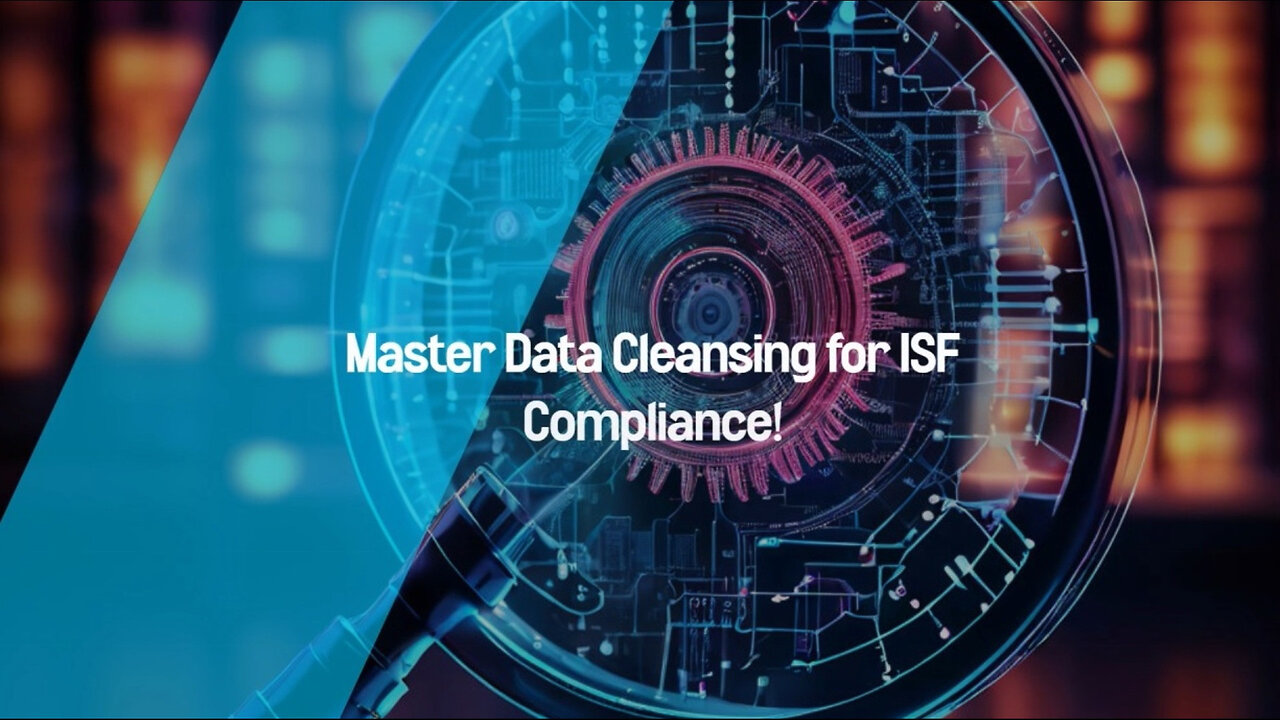Premium Only Content

Maximizing Efficiency: Essential Techniques for Data Cleansing in ISF Compliance
ISF Template | 562-453-7357 | isf@isftemplate.com | www.isftemplate.com
Data cleansing in ISF compliance is an essential process for importers to ensure the accuracy and compliance of their Importer Security Filing. This process involves identifying and rectifying errors, discrepancies, or inconsistencies within the ISF data, which can help minimize the risk of delays, fines, or shipment holds. To effectively conduct data cleansing, importers should follow certain techniques and best practices.
One of the first steps in data cleansing is to conduct a comprehensive data integrity check. This involves verifying the accuracy and completeness of each data field in the ISF filing, such as product descriptions, HTS codes, consignee information, and container numbers. By ensuring that all data is up-to-date and matches the corresponding shipping documents, importers can reduce the chances of errors.
To streamline the data cleansing process and minimize human error, importers should consider utilizing automated tools and software that are specifically designed for ISF compliance. These tools can help identify and rectify errors, validate data against regulatory requirements, and provide alerts for missing or inconsistent information. Leveraging automation can significantly improve the efficiency and accuracy of the data cleansing process.
Staying updated with regulatory changes is also crucial for effective data cleansing. The regulations surrounding ISF compliance can evolve over time, so importers should regularly monitor updates from the CBP and other relevant authorities to understand any modifications to data fields, validation criteria, or filing timelines. By staying informed, importers can adjust and optimize their data cleansing processes accordingly.
Establishing Standard Operating Procedures (SOPs) for data cleansing can help maintain consistency and efficiency. These SOPs should outline the steps, tools, and guidelines for conducting data cleansing. By documenting the process, importers can ensure that all team members involved in ISF compliance follow the same best practices, reducing the risk of errors and discrepancies.
In conclusion, data cleansing is a critical component of ISF compliance for importers. By understanding the importance of data cleansing and implementing techniques such as conducting data integrity checks, utilizing automated tools, staying updated with regulatory changes, and establishing SOPs, importers can ensure the accuracy, completeness, and consistency of their Importer Security Filing.
#usimportbond #isfcustomsbroker #uscustomsclearing #isfentry
Video Disclaimer Here: This video is designed for education and is unaffiliated with US government bodies.
00:36 - Understand the Importance of Data Cleansing
01:05 - Conduct a Data Integrity Check
01:29 - Utilize Automated Tools and Software
02:10 - Stay Updated with Regulatory Changes
02:45 - Establish Data Cleansing SOPs
-

Redacted News
2 hours agoBREAKING! BIDEN'S MASSIVE MIDDLE FINGER TO AMERICANS, TRUMP AND PUTIN PLAN PEACE TALKS | Redacted
22.6K32 -
 LIVE
LIVE
vivafrei
1 hour agoHegseth Confirmation Hearings Recap; Jack Smith Report Recap! La Fires Recap & MORE!
3,680 watching -
 LIVE
LIVE
Candace Show Podcast
1 hour agoIT’S OFFICIAL: Justin Bieber Unfollows Usher | Candace Ep 132
6,454 watching -
 LIVE
LIVE
Awaken With JP
5 hours agoExpect the Unexpected - LIES Ep 74
2,498 watching -
 LIVE
LIVE
Revenge of the Cis
2 hours agoEpisode 1430: The Storm
2,152 watching -
 LIVE
LIVE
Producer Michael
3 hours ago$70K Oud Made from Wood! The World's Most Exclusive Fragrance
80 watching -
 35:47
35:47
Michael Franzese
2 hours agoHBO’s Sons of Ecstasy: The Harsh Truth About the Mob’s Impact on Family
24.8K4 -
 2:01:52
2:01:52
The Quartering
4 hours agoBenny Johnson Backlash, Unhinged NFL Fan Gets Instant Karma, Tiktok Bought By Elon & More!
61.9K61 -
 1:02:43
1:02:43
Chad Prather
2 hours agoPete Hegseth Hearing Happening NOW! WE MUST CONFIRM HIM!
16.4K27 -
 1:40:52
1:40:52
Russell Brand
5 hours agoCalifornia Burns! Who’s Really to Blame? – SF519
117K52